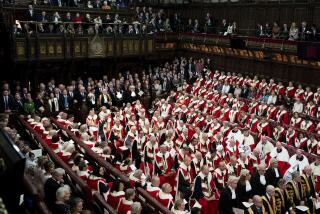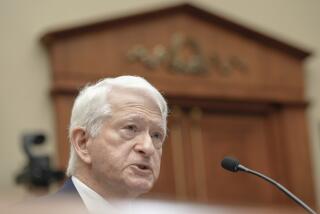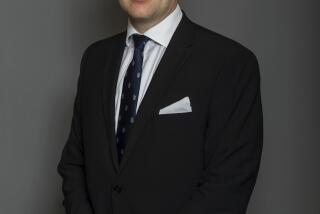Britain’s House of Lords atwitter over corruption scandal
- Share via
LONDON — Their robes are red, their fur cuffs are white and now a corruption scandal has Britain’s House of Lords feeling blue.
The British government announced Monday that it had launched an investigation into four members of the venerable, if anachronistic-seeming, institution after they allegedly told undercover journalists they would be willing to influence legislation in return for money.
The accusations in the Sunday Times newspaper threw Britain’s upper chamber into turmoil and touched off a brouhaha that some are already calling “Erminegate,” after the delicate trim on the crimson gowns that the lords and ladies of the house wear on ceremonial occasions.
In an extraordinary scene broadcast on live television, the leader of the House of Lords, who is appointed by Prime Minister Gordon Brown, told the assembled “peers of the realm” that an investigation into the allegations was underway, as well as an inquiry into sanction procedures for any member found in violation of the chamber’s code of ethics.
“This is damaging, my lords, not just to this house but, I believe, also to Parliament and to politics itself,” said Janet Royall, baroness of Blaisdon, the house leader. “We in this house have a responsibility to adhere to high standards . . . to ensure trust in the whole of our parliamentary process.”
That prompted two of the lords being investigated to rise from their red leather benches and protest their innocence.
“If I have done anything that has brought this house into disrepute, I most humbly apologize,” declared one of the accused, Thomas Taylor, lord of Blackburn. “I feel within my own conscience I have followed the rules and the directions that have been given in this house over the 31 years that I have been a member.”
Taylor and the three other men, all peers belonging to the ruling Labor Party, were approached by reporters masquerading as lobbyists for a foreign businessman who supposedly wanted to open a chain of stores in Britain. The journalists pretended to be seeking help for their client in winning an exemption from a bill that would impose extra taxes.
The newspaper reported that the four peers appeared willing to take up the fictitious client’s cause to get the legislation amended, for consultants’ fees of up to $150,000. Taylor allegedly suggested that he could talk to government ministers and to the civil servants in charge of drafting the bill.
“I will work within the rules, but the rules are meant to be bent sometimes,” Taylor said, according to the newspaper.
Rules of conduct technically forbid members of the House of Lords from accepting financial rewards for exercising their parliamentary influence, but much depends on the rules’ interpretation. Even proven violations do not strip someone of his or her standing as a peer or automatically curtail the right to sit in the upper chamber, which would require an act of Parliament. For example, Conrad Black, the fallen press baron who traded in his Canadian citizenship for a British peerage, remains lord of Crossharbour, even though his lordship’s residence is now a Florida prison cell, to which he was dispatched last year for a fraud conviction.
Another of the peers now under investigation, Lewis Moonie, a former defense minister, allegedly boasted of his impunity.
“The thing with the Lords is that there’s virtually nothing they can do with you, unless you break the law,” Moonie was quoted as saying, adding: “There’s nothing they can do but jump up and down.”
Nonetheless, the prime minister was keen to be seen acting quickly on the budding scandal, mindful that the “sleaze factor” was a major contributor to the fall from power of the opposition Conservatives nearly 12 years ago.
“It’s important that you don’t prejudge these investigations, but these are serious allegations,” Brown said at a briefing with foreign reporters. “We’re determined to get to the bottom of what’s happened, and whatever action needs to be taken will be taken.”
The Sunday Times’ sting operation against the four lords made use of a tactic favored by many British newspapers to get stories that take the rich and famous down a peg. In the past, such machinations have netted an anti-marijuana lawmaker’s son for allegedly selling pot and a party-boy earl for selling cocaine to two reporters who dressed up as rich Arabs and plied the young aristocrat with alcohol.
The current imbroglio has invited renewed scrutiny of the House of Lords as an institution that a political scientist once described as “one of the most curious of the curious anomalies in British public life, defying all logic of democratic and secular politics.”
The House of Commons, whose members are elected by voters, retains ultimate power to make laws in Britain. However, the Lords can try to amend or delay legislation.
The upper chamber remains an unelected, unsalaried body, though its composition has changed greatly. In 1999, then-Prime Minister Tony Blair axed the automatic right of most of the 750 hereditary peers -- heirs of dukes, earls and the like -- to sit in the house.
Now, the vast majority of the 732 members are political appointees, named lifelong peers for their public service, expertise or coziness with the ruling party. Critics suggest that it merely swapped toffs and twits who referred to one another as “my noble friend” for smarty-pants and politicians’ pals who still refer to one another as “my noble friend.”
After news of the scandal broke Sunday, Royall, the leader of the House of Lords, acknowledged on a television news program that there was no way to throw anyone out for ethical lapses. But she suggested that having one’s misdeeds read out in the chamber, to the disapproving clucks of one’s fellow lords and ladies, was punishment enough.
“Now, to people out there, that may not seem like very much,” Royall said. (“No,” her questioner was moved to interpolate.) “But believe you me, to peers themselves, it is extremely serious.”
--
More to Read
Sign up for Essential California
The most important California stories and recommendations in your inbox every morning.
You may occasionally receive promotional content from the Los Angeles Times.











